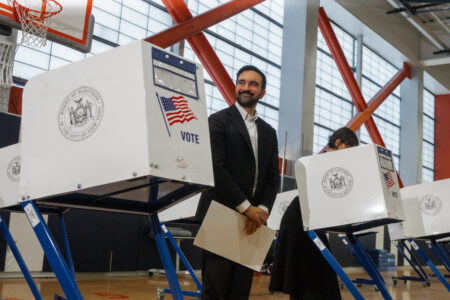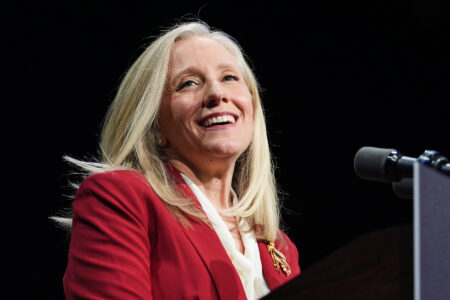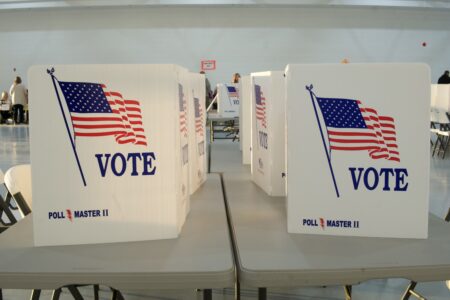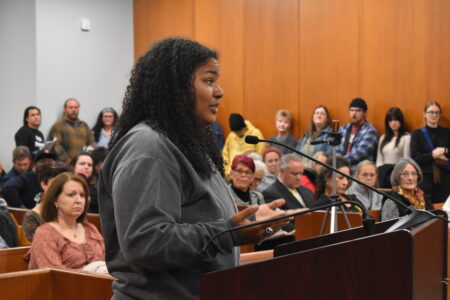West Virginia Lawmakers Sound Off on Proposed Constitutional Amendments
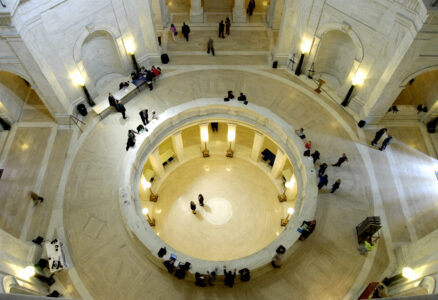
Photo Courtesy of W.Va. Legislative Photography - People mill about in the upper rotunda area of the West Virginia Capitol. Mountain State voters on Nov. 8 will decide on four proposed amendments to the state’s constitution.
WHEELING – Three proposed amendments to West Virginia’s Constitution would increase the power of state lawmakers, giving them authority over local government funds, educational policy and impeachment proceedings within the state Legislature. A fourth amendment would allow churches to incorporate.
Several local legislators contacted by the Sunday News-Register – state senators Ryan Weld, R-Brooke; Owens Brown, D-Ohio; and Charles Clements, R-Wetzel; as well as delegates Pat McGeehan and Mark Zatezalo, both R-Hancock; Shawn Fluharty, D-Ohio; Erikka Storch, R-Ohio; Lisa Zukoff, D-Marshall; and Charles Reynolds, R-Marshall – offered insight on each of the four proposed constitutional amendments going before voters on Nov. 8. They also gave indication how they might vote on the amendments when they go to the polls.
Amendment 1: Clarification of the Judiciary’s Role in Impeachment Proceedings
Amendment 1 would clarify that courts have no authority or jurisdiction to intercede with impeachment proceedings of the House of Delegates or the Senate. It specifies that a judgment rendered by the Senate following an impeachment trial “is not reviewable by any court of this state.”
Weld, the Senate majority whip, explained Amendment 1 resulted from the 2018 case Workman v. Carmichael. In that case, a Supreme Court made up of interim justices granted the writ of prohibition sought by then Justice Margaret L. Workman. She had been impeached on three of 11 articles of impeachment in the House of Delegates.
The court’s action halted impeachment proceedings against her.
“The ruling completely upended our state constitution, and takes away the ability of the legislature to impeach and hold trials of public officials,” Weld explained.
“I can think of no other decision by a court that has done such great violence to our constitution than that one. I am in favor of setting back into place what our founders put into place and balancing the three branches of the government.”
Brown agreed.
“We should support the amendment. I do,” he said. “I can see them (Supreme Court justices) actually interfering, especially at this time. … They should not have (the ability to appeal) in these proceedings.
Zukoff, meanwhile, has a different take.
“I understand why it (Amendment 1) was wanted, but I also think every person should have every right to appeal,” she said. “It bothers me it could be taken away. I worry there will be no way to appeal at all.”
Fluharty fears eliminating state courts’ authority in impeachment proceedings constitutes an infraction of the system of checks and balances between the branches of government.
“Amendment 1 would remove the checks and balances and give all the power to the Legislature,” he explained. “In my view, that is bigger government and not smaller government and not good policy.”
Zatezalo said he was a member of the House Judiciary Committee when the Supreme Court impeachment process took place. He said it became obvious there was no policy at the court to hold them accountable for their spending and other actions.
“We spent all that time (on the impeachment procedures), and all of the sudden we were told it didn’t matter. I think that was wrong,” Zatezalo said.
Clements said he also supported the measure, as did McGeehan and Reynolds. Storch was non-committal.
Amendment 2: Property Tax Modernization Amendment
Amendment 2 would amend the State Constitution by providing the Legislature authority to exempt machinery, equipment and inventory property directly used in business activity from taxation. The personal vehicle tax property tax paid by individuals also would be eliminated if the amendment is passed.
Fluharty successfully pushed that the elimination of the vehicle property tax be included in the ballot language.
“We have a huge surplus,” he said, “and in my opinion, we have to make sure the money goes back to the people.”
Gov. Jim Justice has proposed a 10% reduction in personal income tax and opposes Amendment 2, while many Senate members are behind the proposed amendment and want to eliminate the business-related taxes. Fluharty said both those approaches “are costly,” and he favors a third approach of removing the vehicle property tax.
Zukoff said she is very concerned about the amount of money counties would lose if the amendment is passed. In her district, she said Marshall County’s revenue would drop about $30 million annually, and Wetzel County’s, about $17 millon. The money mostly would come out of public school systems’ budgets
“I understand there is money right now in the treasury to make that up … but we’ve always had a bust and boom economy,” she said. ” I don’t know where we would make it up. I will be voting no for those reasons.”
Like Fluharty, Zukoff suggested West Virginia still should consider eliminating the vehicle property tax, which in Marshall County amounts to $2.75 million yearly.
“If they are interested in doing something for the people and not corporations, they could do that easily,” she said.
On the Republican side, Clements, Storch and McGeehan noted many counties already stand to lose tax revenue in the coming years, and legislative leaders see Amendment 2 as a way to shore up their funding.
“The whole genesis of this is that there are 40 counties around the state that have been receiving declining tax revenues,” Storch explained. “There is definitely a need to intercede before counties are bankrupt.”
She added there is also a lot of benefit to West Virginia equalizing its tax mechanisms to be on par with neighboring Virginia, Ohio, and Pennsylvania – which do not have tax on equipment and machinery and inventory.
“We would like to see the taxes on equipment and inventory done away with, and the only way is through this amendment,” Clements said. “People are saying this is only going to help big corporations. That’s not true. The small businesses are paying like the big people are. It’s cost prohibitive for them, and this could be an economic development tool.”
He said the legislature is looking at a plan to reimburse counties the money they lose based on their revenues over the past five years.
“Some would be getting more money when their revenues are trending down,” Clements added. “The money is coming from general revenue and the billion surplus. The people in research say it can be sustained.
“I don’t think the state will allow the counties to suffer.”
Amendment 2 by itself just gives the Legislature authority to change property tax rates, McGeehan explained.
“With the surplus the government has now, it is one method of giving back money to the residents of the state to reduce the rate of property taxes,” he said.
“I do think this is the one and only chance we will have to eliminate the personal property tax on vehicles, which I think is burdensome to the average guy and gal out there.”
“Unlike the other side, I’m not going to come out and tell people how to vote,” Reynolds said. “I think if they want to vote no, they should vote no. I personally am voting yes.
“I don’t think we should be paying vehicle taxes every year, and it’s a good way to give back their tax dollars.”
Weld and Zatezalo were a yes on the measure, while Brown was a no.
Amendment 3 – Incorporation of Churches or Religious Denominations Amendment
Amendment 3 would authorize the incorporation of churches or religious denominations in West Virginia, which is already happening, according to state lawmakers.
The West Virginia law prohibiting incorporation is a holdover from the state’s time as Commonwealth of Virginia, they explained. All other states – even Virginia – now have changed their constitutions to allow for the incorporation of churches, they added.
“It allows churches to form a board of directors, and have all the protections of a corporate entity,” Weld explained. “It brings codified ways of doing business and accountability within the church.
“It’s not about becoming a money-making business. It’s about the protection of being a corporate entity.”
All of the legislators interviewed said they support the amendment.
“If other states are doing it, it shouldn’t hurt us if we do it as well,” Zukoff said.
Amendment 4: The Education Accountability Amendment
Amendment 4 seeks to make the actions and policies of the West Virginia Board of Education subject to legislative review, approval, amendment, or rejection.
Presently the State Board has no oversight under state government, Republican lawmakers explained.
“Amendment 4 seeks to clarify that the Board of Education does not constitute a fourth branch of government,” McGeehan said. “All the other administrative offices in the executive branch, when they develop rules as state organizations, must pass those rules to the Legislature for approval because the Legislature is the sole exclusive authority for enacting laws.
“Especially when a rule has an impact on private citizenry, it must be approved by the Legislature,” he added. “Right now the State Board of Education develops all these rules for the education of our children that have wild effects on curriculum and how education works in general. It’s important these rules be passed in front of the Legislature.”
Storch added the State Board of Education “has not always promulgated rules that are in compliance with state law.”
“Every other agency has to come before the legislature,” she said. “This would bring the state board into compliance along with other agencies.
“State board members are appointed. There are no elected officials, and the people don’t weigh into who comprises the board. The legislature is up for election every two years, and it would be subjected to public scrutiny if it goes contrary to the public’s will.”
Weld said Amendment 4 will bring accountability and transparency to West Virginia’s education system.
“Right now, all the decisions of the Department of Education are established by the State Board of Education that answers to no one,” Weld said. “They aren’t accountable to anyone because what is the recourse?”
The public has expressed concerns about politics getting into and affecting education policies, and that would now be “under the political whim of the Legislature,” he said.
“Right now, all are subject to the political whim of one person – the governor, who appoints members of the State Board of Education,” Weld said.
Democrats, meanwhile, aren’t in line with the proposed amendment.
“This is one of the most dangerous amendments I’ve seen,” Brown said. “By being there in Charleston, I know the partisanship. I know the control they would have. Certain groups of people would try to exploit it. … There’s too much partisanship, and I don’t want our schools in this tug of war.
“There are groups in the Legislature who are trying to destroy public education, he added. “That is where the real danger is. Some of the bills they have passed are directly in conflict with public education.”
Zukoff noted the Department of Education has education experts there, and board members rely on recommendations made by the policy experts.
“There are only a few teachers in the Legislature,” she said. “Someone who has expertise in education should be making those approvals. Especially with a part-time legislature, (awaiting legislative approval) could hinder action when new rules come down. It’s not a good move, and is not needed.”
Zatezalo approves of the amendment, as do Clements and Reynolds. Fluharty believes in local control for education.
State Sen. Mike Maroney, R-Marshall, and Delegate Phil Diserio, D-Brooke, could not be reached for comment for this story.


